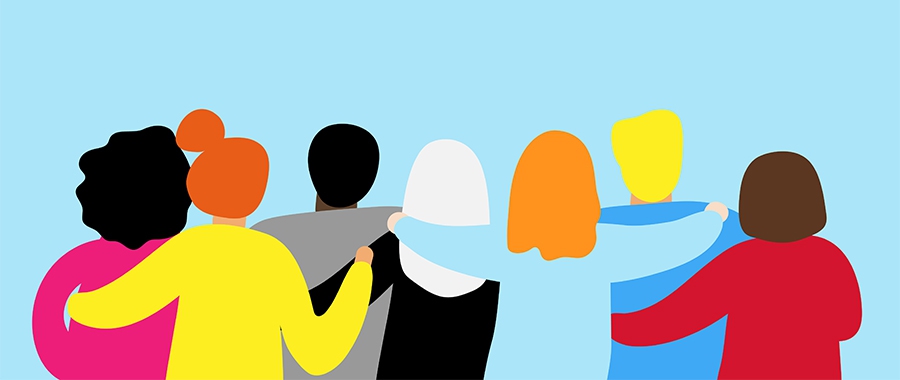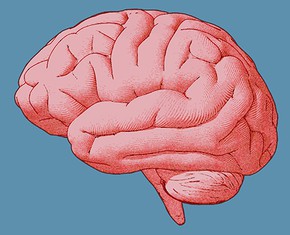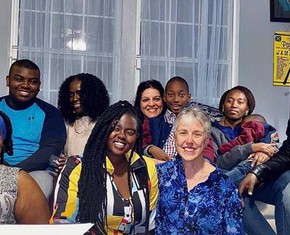The views expressed in our content reflect individual perspectives and do not represent the authoritative views of the Baha'i Faith.
“There was another shooting today,” a teacher friend of mine said. “What about writing an article relating to these terrible tragedies?”
My field is economics, so I initially felt hesitant—but I reminded myself about the many years I worked in the school system, where my first and foremost responsibility was protecting my precious students from the usual dramas and bullying.
I told my friend that I would try, so this is my attempt to share what’s in my heart about these horrible mass shootings.
At the outset, I admit that I don’t have all the solutions. I’m uncomfortable even tackling the subject, due to its explosive and political nature, the polarization of emotions it evokes and especially my personal experience with violence. Also, as a Baha’i, I will not insert myself into the party politics that have become so tied up in this issue.
But these horrific killings must stop, so we need to start somewhere.
We have to remember these mass shooters—these killers of children—did not come from the moon or some other planet. These disturbed individuals were and are our kids, our students, our neighbors, our cousins, even our friends. Many of them were almost invisible to us, but yet they existed, and most of us missed the signs of their struggles. We failed to see how ill-equipped they were to deal with the realities around them, and as a consequence, we did not help them. Instead, we shunned them, disenfranchised them or ignored them.
As you can already see, I want to take a self-examining approach to the problem instead of pointing the finger at the usual people and organizations. Rather than looking elsewhere, let’s look at ourselves first. I believe we spend very little time exploring our own roles in this crisis, and consequently, we don’t do enough to discover how we can empower ourselves and others to help to avoid these tragedies from happening.
We can all do things that may lead to preventing more disasters. We can pay attention to those who are ignored or bullied or ostracized, we can show them that we care, we can build alternative activities that allow them some respite from their negative environments, we can connect them to positive, welcoming people and courses and group activities. For example, we can connect them with Baha’i youth activities that focus on spiritual and moral education and on serving the community. There are countless things we could do if we cared enough and loved enough.
The Baha’i teachings ask us to love everyone, because God in His wisdom knows that love is the real solution. Abdu’l-Baha, who exemplified love all his life through his actions, said:
Love gives life to the lifeless. Love lights a flame in the heart that is cold. Love brings hope to the hopeless and gladdens the hearts of the sorrowful. In the world of existence, there is indeed no greater power than the power of love. – Paris Talks, p. 179.
When I worked in the educational system, I had some sleepless nights worrying about some of the kids I knew, who were so full of anger and frustration that I was afraid that they might do some harm to themselves or others. Many staff members in just about every school have felt these experiences.
You might ask: Why were those students so hurt and angry? I would say because they were not getting enough love, care and attention. Most of them were deeply lonely, believing strongly that nobody understood them or cared about them. They craved love, but what they were getting was anger, punishment and disciplinary rules that aimed to set them right without addressing the root cause of their problems.
However, I am not trying to portray mass shooters as victims. I am fully aware that some had serious issues and needed professional help. Yet, in some ways, they too are, like you and I, victims of a disease that we all are subjected to, and that is living in societies where we don’t receive enough love and understanding. I call the cause of this disease vitamin L deficiency—the absence of love. In most cases, the essentially spiritual remedy of love can work much more effectively than many other legal prevention solutions.
Alternatively, we could arm more guards to protect our schools, shopping malls and public places; we could install metal detectors everywhere, we could do more body searches to confiscate weapons—but since those things aren’t very practical or effective, ultimately I wish we would spend our time and resources on how, as a society, we can reach out to those angry and hurting individuals before they do something wrong.
How can we, as human beings, lessen the emotional burden of people breaking down under the pressure of life’s problems which will lead them to an awful path, and guide our children into grave danger? The Baha’i teachings say we can take action to truly begin to address that Vitamin L deficiency so many people suffer from: “Love manifests its reality in deeds, not only in words—these alone are without effect.” – Ibid., p. 36.
If we cared for and loved all human beings, and did so with deeds rather than words, I believe many of those disturbed, angry shooters might choose a different path. I know this well since I witnessed the drastic change that love and caring made for many of my own students, who I honestly thought might do some harm. In all my years of dealing with troubled kids, I learned to look beyond their anger and bad behavior and all the negative barriers they put up in order not to get hurt—because behind all that hostility was usually a scared little person crying out for attention, who just wanted to be accepted and loved like we all do.
So we can take the usual route of blaming our governments for lack of proper gun control, or gun makers, or violent video games and all the rest of the players in this sad affair, but I strongly suggest we first look at ourselves and accept some of the responsibility, then resolve to befriend the sad, the alienated and the potentially explosive.
By being aware of our own potential power as a preventive agent in these mass shootings, combined with proper legal prevention measures and reasonable safety precautions, we can dream of a day when these tragedies will be nothing but a bizarre footnote in a very sad and dark period of human history.
















Comments
Sign in or create an account
Continue with Googleor